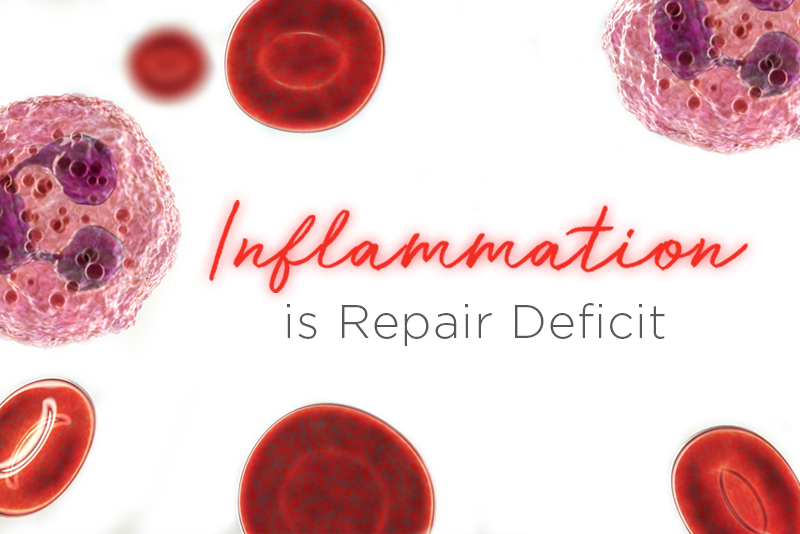Inflammation is a familiar term, likely conjuring images of swelling and redness, stiffness and pain. These are certainly characteristics of acute inflammation. But in this post, we want to rethink inflammation and share evidence revealing that inflammation is really repair deficit.
While inflammation is usually presented as a ‘fire’ to be ‘fought’ or a symptom to be suppressed, repair deficits are opportunities to rebuild, renew and rehabilitate. Essential nutrient deficits, toxin excess, physical deconditioning and mental anguish potentiate and/or cause the blocks to repair experienced clinically as inflammation.
Animals possess mechanisms designed to deal specifically with wound healing repair and microbial defense so that ‘inside self’ is distinguished from ‘outside world.’ In humans, this exquisitely choreographed suite of reactions is only now being fully appreciated.
Inflammation insights
In Western medicine, inflammation is seen as being acute or chronic.
Acute inflammation is the short-term immune response our body mounts in cases of trauma, infection, and allergy when it uses up and runs out of essential protective, energizing nutrients.
The immune system recognizes foreign items and determines if they are “self” (non-threatening, tolerant) or “non-self” (threatening, intolerant). In healthy people, these foreign threats trigger an acute inflammatory response. The appropriate response consists of releasing pro-inflammatory compounds when needed and turning them off with anti-inflammatory antioxidants when the threat has been neutralized or the repair completed. Homeostasis is restored. Read about Nature’s Solution to Inflammation.
When the immune system is actively engaged in defense against foreign threats, the function of repairing the body from injury or daily wear and tear is postponed.
Infectious agents and digestive remnants (incomplete digested material) are treated equally by the immune system… both are equally foreign. Digestive remnants occur due to maldigestion, prolonged transit time and consequent toxicant reabsorption. Since defense takes precedence over repair in the immune system, while the immune system is defending against these digestive remnants, it is not working on repairing the intestines. The result is increased intestinal permeability due to cumulative repair deficit. Increased permeability allows more digestive remnants to invade the body, increasing the defense work in the immune system. It becomes a vicious cycle where the underlying maldigestion and repair deficit set the stage for host hospitality to chronic infection and/or autoimmune, self-attacking chronic degenerative illness.
Chronic Inflammation Revealed
Chronic inflammation occurs when repair deficits persist. The body calls for repair, and the first responder team is unable to complete the repair or defense mission. Recruits are called in the form of pro-inflammatory signals. Persisting inflammation lingers, continuing to call for pro-inflammatory responses even as the immune systems are inadequate to the repair need.
Persisting inflammation means accumulating repair deficits. Silent or unappreciated inflammation is due to loss of tolerance and homeostasis in the immune defense and repair system. Repair deficits account for more than two thirds of all chronic disease including metabolic syndrome, diabetes, heart disease, Alzheimer’s neurodegeneration, autoimmune conditions and some cancer.[i] These conditions of cumulative repair deficit reduce life quality and increase costs of mostly palliative, symptom suppressive care.
When repair deficits accumulate in blood vessel linings, atherosclerosis, coronary artery and peripheral artery diseases emerge. Repair deficits of the endocrine organs such as the pancreas or adrenal glands, can result in diabetes, Cushing’s hyperadrenalism or Addison’s hypoadrenalism. Most chronic pain in joint tissue such as arthritis, bursitis, back pain and costochondritis is long-term deficit of repair. When the repair deficits are in the lining of the gut, acquired lactose and gluten intolerance and inflammatory bowel diseases can result). And these are just a few of the common health complaints that should be viewed as repair deficits.
Monitoring inflammation with a simple hsCRP (high sensitivity C Reactive Protein) test is vital to disease prevention. When interpreted properly, the hsCRP can guide diet, lifestyle, and supplementation toward lowered risk of the myriad conditions above. Learn more about hsCRP and 7 other important tests in the Power of Predictive Biomarkers report.
Immune Hypersensitivities
Inflammation or repair deficit often imbalances immune responses such that delayed allergies develop. Delayed or late-phase food and chemical sensitivities then contribute to chronic low-grade systemic inflammation and play a role in causing or amplifying autoimmune, chronic and degenerative illnesses.
Restoring immune tolerance
Restoration of immune competence depends on identification of elements in both biochemistry and lifestyle that need strengthening and substitution for reactive elements until tolerance is restored[ii]. Best clinical outcomes incorporate new insights from molecular biology to enable healthy immune, neuro-hormone, digestive, and detoxification system functions concurrently. Read case studies in multiple conditions.
Inflammation is fundamentally repair deficit, an opportunity to identify correctable and acquired needs. The usual, pathology-based approach is to fight and vanquish inflammation through anti-inflammatory medications that suppress both symptoms and repair. Rethinking the causes reveals opportunities to stimulate healing responses as described above that resolve the need, restore homeostasis and complete the repair, thus restoring comfort and function.
Health for life is a goal of medicine. While it takes a rethinking, today we are able to provide predictive, cost effective risk reduction and health enhancement for each individual.
To learn about the tests used to detect immune hypersensitivities, visit www.ELISAACT.com. For more information about safer, natural solutions to inflammation, see PERQUE Repair Guard or PERQUE Pain Guard Forte.
[i] Schmidt MI, Duncan BB. Diabesity: an inflammatory metabolic condition (Review). Clin Chem Lab Med. 2003 Sep; 41(9):1120-1130.
[ii] Jaffe R, Mani J, DeVane J, Mani H. Tolerance loss in diabetics: Association with foreign antigen exposure. Diabetic Medicine, 2006; 23(8): 924-925.
Did you enjoy this post? We post new content regularly! Click here to see our latest blog posts.


